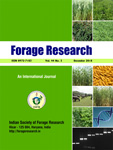RAJNI YADAV*, K. K. BHARDWAJ, VISHAL GOYAL, SATPAL AND M. K. SHARMA
Department of Soil Science, Department of Genetics & Plant Breeding (Forage Section)
CCS Haryana Agricultural University, Hisar-125 004 (Haryana), India
*(e-mail: rajniyadav211295@gmail.com)
(Received: 1 September 2023: Accepted: 29 December 2023)
SUMMARY
The imbalanced uses of inorganic fertilizers deteriorates soil health, declines the soil nutrient status, increased environmental pollution and also boost the cost of production of fodder crops. Application of organic sources alone to fulfill the demand of plant essential nutrient is also complex because an enormous amount of manure is required. Therefore, to sustain soil health and production, balanced use of fertilizer based on soil test crop correlations (STCR) approach with integration of organic manures is very essential. The integrated nutrient management (INM) system includes prudent application of organic, inorganic and biofertilizer in fodder crop to achieve optimal yields without causing harm to ecosystem. Application of integrated nutrient management practices improves availability of soil macro and micronutrient content in soil. The soil organic carbon, microbial biomass carbon,microbial population, urease, dehydrogenase and phosphatase activity were found highest under integrated treatments as compared to devoid of manures in fodder production. Hence it may be concluded that soil physical, chemical and biological properties are efficiently improved by adopting the integrated nutrient management practices.
Key words: Fodder, fertilizer, integrated nutrient management and soil test crop response

